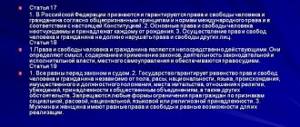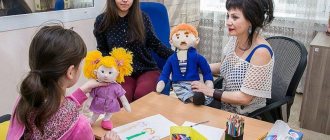List of rights
Adolescence is considered the period from 14 to 18 years. Having reached fourteen, a citizen receives a large amount of rights. However, their full implementation is still limited to legal representatives. Let's look at the basic rights of teenagers:
- personal;
- property;
- housing;
- for education;
- for labor;
- to protect rights.
This list represents the basic rights that adolescents are entitled to upon reaching a certain age. From the age of 14, new opportunities are added to minors every year.
Personal
The Family Code assigns the child the right to a name. However, initially it is simply an opportunity to have personal data. Only upon reaching the age of ten is consent required to change the name of a minor. And from the age of 14, a minor can change his data independently, taking into account the opinion of his legal representative.
The right to be raised in a family also belongs to citizens from birth. Once they reach 10 years of age, they can decide which parent to live with if they live separately. A teenager left without care must give consent to his family placement. The candidate for guardianship first establishes contact and builds a trusting relationship with him.
The opinion of the minor will also be clarified in other matters directly related to him. In particular, these include deprivation of parents' rights and their restoration.
Property
From the moment of birth, a child has the right to own any things not prohibited by law. The fourteenth anniversary marks a new stage in the property rights of a minor. Now he can dispose of property with the consent of his legal representative.
Important! When reducing a teenager's property, in addition to the decision of the parents, permission from the guardianship authority is required.
The law establishes the rights of a child at the age of 14 in Russia, which children can exercise independently. They are added to transactions permitted for minors. Among them:
- spending your salary and stipend;
- management of funds located in bank accounts opened by a teenager;
- the opportunity to have copyrights and receive income from them.
A minor may purchase food, clothing, art supplies and other items for personal use. In addition, the teenager has the opportunity to donate property with the consent of the guardian.
Housing
A teenager has the right to live in an apartment that belongs to his parents on the right of ownership, under a lease agreement or free provision. When a child turns fourteen years old, he can live separately from his mother and father, for example, with his grandmother or other relatives.
Important! A minor raised in a foster family (guardianship, foster) can live separately from his legal representative from the age of 16 on the basis of an appropriate order from the guardianship authority.
A teenager can not only own living space, but also participate in the process of disposing of property. For example, for sale (with the consent of the guardian) or for rent on your own behalf.
If a transaction worsens the housing rights of a minor, permission from the municipal guardianship authority is required to carry it out. To obtain it, you need a personal statement from the teenager.
For education
The legislation of the Russian Federation gives teenagers the right to receive free education. The student can participate in choosing the type of education and the language in which it is conducted. At the same time, the opinion of parents in this matter should not be decisive.
Although education is the right of the minor, the legal guardian has the responsibility to provide space for learning. Otherwise, punitive measures provided for by the legislation of the Russian Federation will be taken against them.
To work
Minors can carry out labor activities. At the same time, the workload and length of the working day must correspond to the age of the teenager. Let's take a closer look:
- 14 years old - concluding an employment contract to carry out light activities that are not harmful to health, with the consent of the legal representative and the municipal guardianship department.
- 15 years – conclusion of an employment contract by a child who has received basic general education (9 grades) to carry out light activities that are not harmful to health, at his own discretion.
- 16 years old – conclusion of an employment contract by a teenager who is a citizen of the Russian Federation, without taking into account the opinion of his parents.
If a minor is receiving education, he may be employed only outside of school hours and without prejudice to his studies. It is prohibited to use teenagers for harmful and strenuous activities.
Important! The child’s performance of activities under an employment contract is the basis for recognizing him as fully capable until he reaches the age of eighteen, that is, the ability to independently perform duties and exercise rights. To do this, you must contact local authorities with the consent of your parents.
To protect rights
Protection of rights is an integral part of civil capacity. The ability of a teenager to independently apply to specialized authorities for the protection of violated interests arises from the age of 14.
Currently, such a preventive method of protecting children from domestic violence as “hotlines” has become widespread. A teenager can call a specialist around the clock to request protection.
The most common reason a child seeks help is abuse by a legal representative. In this case, a minor can apply not only to the municipal guardianship department or the prosecutor's office, but also to court on his own behalf.
Personal and property rights of minor children under the legislation of the Russian Federation.
⇐ PreviousPage 10 of 16Next ⇒
The personal non-property rights of minor children include: • The child’s rights to live and be raised in a family . This right is one of the most important rights of a child due to the fact that family education allows for normal physical, moral, intellectual and social development. Every child has the right to live and be raised in a family, as far as possible, the right to know his parents, the right to be cared for by them, and the right to live together with them, except in cases where this is contrary to his interests. A child has the right to be raised by his parents, to ensure his interests, comprehensive development, and respect for his human dignity. In the absence of parents, in the event of deprivation of their parental rights and in other cases of loss of parental care, the child’s right to be raised in a family is ensured by the guardianship and trusteeship authority. • The child's rights to communicate with parents and other relatives . The child has the right to communicate with both parents, grandparents, brothers, sisters and other relatives. The dissolution of the parents' marriage, its recognition as invalid or the parents' separation do not affect the rights of the child. If the parents live separately, the child has the right to communicate with each of them. A child has the right to communicate with his parents also if they live in different states. A child in an extreme situation (detention, arrest, detention, being in a medical institution, etc.) has the right to communicate with his parents and other relatives in the manner prescribed by law. • Child's rights to protection . The child has the right to protection of his rights and legitimate interests. Please note that the protection of the rights of minor children and the legitimate interests of children is carried out by parents (persons replacing them), and in cases provided for by this Code, by the guardianship and trusteeship authority, the prosecutor and the court. A minor, recognized in accordance with the law as fully capable before reaching the age of majority, has the right to independently exercise his rights and obligations, including the right to defense. A child has the right to protection from abuse by parents (persons in their stead). In the event of a violation of the rights and legitimate interests of a child, including in the event of non-fulfillment or improper fulfillment by parents (one of them) of the responsibilities for the upbringing, education of the child, or in the case of abuse of parental rights, the child has the right to independently apply for their protection to the guardianship and trusteeship authority, and reaching the age of fourteen years in court. Officials of organizations and other citizens who become aware of a threat to the life or health of a child, a violation of his rights and legitimate interests, are obliged to report this to the guardianship and trusteeship authority at the place of the child’s actual location. Upon receipt of such information, the guardianship and trusteeship authority is obliged to take the necessary measures to protect the rights and legitimate interests of the child. • Children's rights to express their opinions . The child has the right to express his opinion when deciding any issue in the family that affects his interests, as well as to be heard during any judicial or administrative proceedings. Taking into account the opinion of a child who has reached the age of ten is mandatory, except in cases where this is contrary to his interests. In cases provided for in Articles 59 (change of first and (or) last name of a child), 72 (restoration of parents in parental rights), 132 (adoption), 134 (change of last name, first name and patronymic of an adopted child), 136 (registration of adoptive parents as parents adopted child), 143 (change of the child's first name, patronymic or surname when the adoption is cancelled), 145 (appointment of a guardian for a child who has reached the age of ten years) of the Family Code of the Russian Federation, guardianship and trusteeship authorities or the court can make a decision only with the consent of the child who has reached the age of ten years . The child’s rights to his first name, patronymic and last name . The child has the right to a first name, patronymic and last name. The child's name is given by agreement of the parents, the patronymic is assigned by the father's name, unless otherwise provided by the laws of the constituent entities of the Russian Federation or based on national custom. The child's surname is determined by the surname of the parents. If the surnames of the parents are different, the child is assigned the surname of the father or the surname of the mother by agreement of the parents, unless otherwise provided by the laws of the constituent entities of the Russian Federation. If there is no agreement between the parents regarding the first and (or) last name of the child, any disagreements that arise are resolved by the guardianship and trusteeship authority. If paternity has not been established, the child’s first name is given according to the mother’s instructions, the patronymic is assigned according to the name of the person recorded as the child’s father, and the last name according to the mother’s last name. In accordance with Article 59 of the Family Code of the Russian Federation, at the joint request of the parents, until the child reaches the age of fourteen, the guardianship and trusteeship authority, based on the interests of the child, has the right to allow the child to change the name, as well as change the surname assigned to him to the surname of the other parent. If the parents live separately and the parent with whom the child lives wants to assign his surname to him, the guardianship and trusteeship authority resolves this issue depending on the interests of the child and taking into account the opinion of the other parent. Taking into account the parent’s opinion is not necessary if it is impossible to establish his whereabouts, deprivation of his parental rights, recognition as incompetent, as well as in cases of parental evasion without good reason from raising and maintaining the child. If a child is born from persons who are not married to each other, and paternity has not been legally established, the guardianship and trusteeship authority, based on the interests of the child, has the right to allow changing his surname to the surname of the mother, which she bears at the time of making such a request. Changing the first and (or) last name of a child who has reached the age of ten years can only be done with his consent. Property rights of the child Article 60 of the Family Code of the Russian Federation establishes the property rights of the child, according to which the child is endowed with the following property rights: • The child has the right to receive maintenance from his parents and other family members . The amounts due to the child as alimony, pensions, benefits are placed at the disposal of the parents (persons replacing them) and are spent by them on the maintenance, upbringing and education of the child. The court, at the request of a parent obligated to pay alimony for minor children, has the right to make a decision to transfer no more than fifty percent of the amounts of alimony to be paid to accounts opened in the name of minor children in banks. • The child has the right of ownership of income received by him, property received by him as a gift or by inheritance, as well as any other property acquired with the child’s funds . The child’s right to dispose of property owned by him is determined by Articles 26 and 28 of the Civil Code of the Russian Federation. Young children aged six to fourteen years
has the right to independently carry out only the following transactions: • small household transactions that are aimed at meeting the ordinary, everyday needs of a minor or members of his family, for example, the purchase of school supplies;
• transactions aimed at obtaining benefits free of charge, which do not require notarization or state registration, for example, accepting gifts of toys and items of clothing; • transactions for the disposal of funds provided by a legal representative or with the consent of the latter by a third party for a specific purpose or for free disposal, namely, children can receive money from parents or other legal representatives and spend it on their needs. All other transactions for young children are made on their behalf only by parents, adoptive parents or guardians. Minors aged fourteen to eighteen years
have the right to independently: • Conduct small household transactions and other transactions that are permitted for minor children; • Manage your earnings, scholarships or other income; • Exercise the rights of the author of a work of science, literature or art, invention or other result of his intellectual activity; • In accordance with the legislation of the Russian Federation, make deposits in credit institutions and manage them; • Be a member of a cooperative (upon reaching sixteen years of age). All other transactions for minors aged fourteen to eighteen years are made only with the written consent of their legal representatives. In case of violation of this requirement, a transaction made by a minor may be declared invalid in court at the suit of parents (adoptive parents) or a guardian. When parents exercise powers to manage the child’s property, they are subject to the rules established by civil law regarding the disposal of the ward’s property. The child does not have the right of ownership of the parents' property, and the parents do not have the right of ownership of the child's property.
35. The right of parents to raise children: concept and content.
Parents have the right and responsibility to raise their children. This is the main idea of family education from a legal point of view, embodied in paragraph 1 of Art. 63 RF IC.
Moreover, as enshrined in paragraph 1 of Art. 63 of the RF IC, parents not only have the right, but also the obligation to raise their children. Parents are obliged to take care of the health, physical, mental, spiritual and moral development of their children. In this regard, it is quite reasonable for the law to establish the responsibility of parents for the upbringing and development of the child, which also meets the requirements of Art. 18 and 27 of the Convention on the Rights of the Child. For failure to fulfill or improper fulfillment of responsibilities for raising children, parents can be brought to various types of legal liability: administrative (Article 5.35 of the Code of Administrative Offenses of the Russian Federation), civil law (Articles 1073-1075 of the Civil Code of the Russian Federation), family law (Articles 69, 73 RF IC), criminal (Article 156 of the RF Criminal Code). The principle of equal responsibility of parents for the upbringing of minor children is also enshrined in the legislation of some constituent entities of the Russian Federation. Moreover, in a number of regions of the country, at the same time, it is also stipulated that the work of raising children is equal to any other work and is the basis for decent social security.
Parents are the first teachers who are obliged to lay the foundations for the physical, moral and intellectual development of the child’s personality in early childhood. For these purposes, parents are given freedom to choose the means and methods of raising their child in compliance with the restrictions provided by law (clause 1 of Article 65 of the RF IC), namely: parents do not have the right to cause harm to the physical or mental development of the child, his moral development. Methods of upbringing must exclude neglectful, cruel, rude, degrading treatment, insult or exploitation of the child. An integral component of the process of raising a child and forming him as a comprehensively developed personality is education. In accordance with paragraph 4 of Art. 43 of the Constitution of the Russian Federation, parents or persons replacing them ensure that their children receive basic general education (i.e. education in the amount of 9 classes of a comprehensive school). The requirement of compulsory basic general education in relation to a specific student remains in force until he reaches the age of fifteen, if the corresponding education has not been received by the student earlier (clauses 3, 4 of Article 19 of the Education Law).
The state guarantees citizens the right to education, universal access and free basic general and secondary vocational education in state or municipal educational institutions.
In paragraph 2 of Art. 63 of the RF IC confirms the constitutional norm on the obligation of parents to ensure that their children receive basic general education. At the same time, parents need to proceed from the fact that education should ensure that the child develops a picture of the world adequate to the modern level of knowledge and the level of the educational program and the formation of a person and citizen integrated into his contemporary society and aimed at improving this society. The actual content of education should be aimed at achieving the following main goals:
— development of the child’s personality, talents, mental and physical abilities;
— fostering respect for human rights and fundamental freedoms;
- fostering respect for parents, the language and values of the country in which the child lives, the country of his origin and a civilization different from his own;
- preparation for conscious life in the spirit of mutual understanding, peace, tolerance, equality of men and women and friendship between peoples, ethnic and religious groups, as well as persons from among the indigenous population;
— careful attitude towards the environment.
The rights and responsibilities of parents (persons replacing them) in the field of education of minor children are determined by Art. 52 of the Law of the Russian Federation on Education and include:
— choice of form of training;
— selection of educational institutions;
— protection of the legal rights and interests of the child;
— participation in the management of an educational institution;
— implementation of the charter of the educational institution.
The content of the right to education is not defined in law. Legislation, in principle, cannot regulate the educational process in detail. In Art. 63 of the RF IC, the right to education is outlined in the most general form. This norm states that parents are obliged to take care of the health, physical, mental, spiritual and moral development of their children. How this care is carried out, what methods and techniques parents use when raising their children, the parents themselves decide. Parents are free to choose forms and methods of education as long as they do not go beyond the limits established by law.
In paragraph 1 of Art. 65 of the RF IC contains a list of actions and actions of parent-educators that they do not have the right to perform. This includes:
- harm to the physical and mental health of children (here attention is focused on the undesirable end result of the behavior of parents as educators);
- causing harm to the moral development of a child (this prohibition has a similar goal);
- the use of methods of education associated with neglectful, cruel, rude, degrading treatment of a child. Thus, the RF IC puts a legal barrier to the application of essentially anti-pedagogical methods of education to children. This barrier is expressed in the existence of a categorical ban on committing actions that pose varying degrees of danger to the upbringing of a minor;
- abuse or exploitation of children. Moreover, insult can be caused both by word and action. Exploitation should be understood as the use of the help and labor of a child of any age that goes beyond the scope of family pedagogy.
Fixed in paragraph 1 of Art. 65 of the RF IC, legal regulations are not only a model of lawful behavior of a parent as an educator. Any deviation from the requirements formulated in this legal norm is fraught with deprivation, restriction of parental rights, cancellation of adoption, removal of a guardian (trustee), termination of the agreement on the transfer of a child to be raised in a family. All kinds of deviations from the law are also taken into account when the court resolves disputes related to the upbringing of children.
⇐ Previous10Next ⇒
Recommended pages:
Use the site search:
The legislative framework
The rights and responsibilities of minors are established by law. The main regulations that regulate the protection of adolescents have been in force for a long period of time. Among them:
- Convention on the Protection of the Rights of the Child.
- Constitution of the Russian Federation.
- Family code.
- Housing Code.
- Labor Code.
- Civil Code.
- Guardianship law.
- Education Act.
- Other regulations governing the protection of the rights of minors.
Information about the rights of adolescents should be freely available. Educational organizations are required to conduct lessons aimed at improving the legal literacy of minors.
Article 58 of the RF IC. The child’s right to a first name, patronymic and last name
- The child has the right to a first name, patronymic and last name.
- The child's name is given by agreement of the parents, the patronymic is assigned by the father's name, unless otherwise provided by the laws of the constituent entities of the Russian Federation or based on national custom.
- The child's surname is determined by the surname of the parents. If the surnames of the parents are different, the child is assigned the surname of the father or the surname of the mother by agreement of the parents, unless otherwise provided by the laws of the constituent entities of the Russian Federation.
- If there is no agreement between the parents regarding the first and (or) last name of the child, any disagreements that arise are resolved by the guardianship and trusteeship authority.
- If paternity has not been established, the child’s name is given at the direction of the mother, the patronymic is assigned by the name of the person recorded as the child’s father (clause 3 of Article 51 of this Code), and the surname is assigned by the mother’s surname.
Responsibilities of a teenager in society
Every citizen not only has rights, but also bears responsibility for the actions he commits. Teenagers are no exception to this rule.
Certain responsibilities are assigned to a minor as a citizen of the Russian Federation. They are inherently linked to the fact of citizenship. Among them:
- obtaining a passport;
- military registration;
- education.
The passport of a citizen of the Russian Federation is the main identification document. Every teenager over 14 years of age is required to take all measures to receive it within 30 days. Otherwise, liability arises in accordance with the law. In this case it is a fine.
All males who have reached the age of seventeen are subject to military registration. The selection is made by specialized bodies depending on the health status of the conscript.
The child’s right to education is contrasted with the obligation to acquire knowledge. This includes proper behavior in class, respectful attitude towards teachers and officials of the organization, completion of homework, and compliance with the charter of the institution. However, responsibility for improper performance of training obligations is not assigned to
on the minor, but on his parents.
Separately, it is worth highlighting the parental responsibilities of minors. From the age of 16, a teenager can independently raise his child and bear responsibility for improper fulfillment of his obligations.
Article 54. The right of a child to live and be raised in a family
1. A child is a person who has not reached the age of eighteen years (the age of majority).
2. Every child has the right to live and be raised in a family, as far as possible, the right to know his parents, the right to their care, the right to live together with them, except in cases where this is contrary to his interests.
A child has the right to be raised by his parents, to ensure his interests, comprehensive development, and respect for his human dignity.
In the absence of parents, in the event of deprivation of their parental rights and in other cases of loss of parental care, the child’s right to be raised in a family is ensured by the guardianship and trusteeship authority in the manner established by Chapter 18 of this Code.
Teen Responsibility
From the age of 14, a teenager can be held accountable. When committing an offense, a person is subject to punishment in accordance with criminal law. If previously the maximum measure was registration, then upon reaching the specified age, depending on the crime, the child may receive a punishment, even including imprisonment.
From the age of 16, a minor can be subject to administrative measures. Violation of traffic rules, petty hooliganism, appearing in public places under the influence of alcohol or drugs are grounds for bringing a teenager to justice on a general basis.
In addition, the minor is now obliged to compensate for the damage caused. These actions are carried out in accordance with Civil legislation.
Family responsibilities
The rights and responsibilities of minors from 14 to 18 years of age in the family are not fundamentally different from the powers of young children. They are not legally established; they are based on personal child-parent relationships.
A child’s household responsibilities mean respectful attitude towards older relatives, brothers and sisters, taking care of property, and helping with housekeeping. These actions must be performed voluntarily.
TV shows, newspapers and magazines, and the Internet are full of information about the rights of children and adolescents. However, few minors think about compliance with duties and possible liability for violations of the law.






